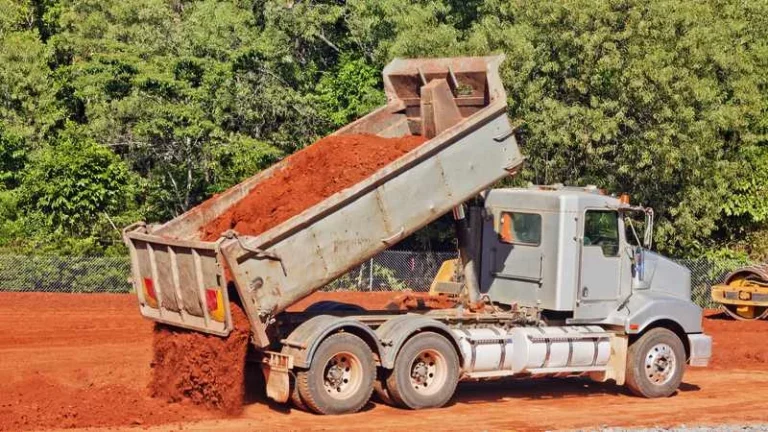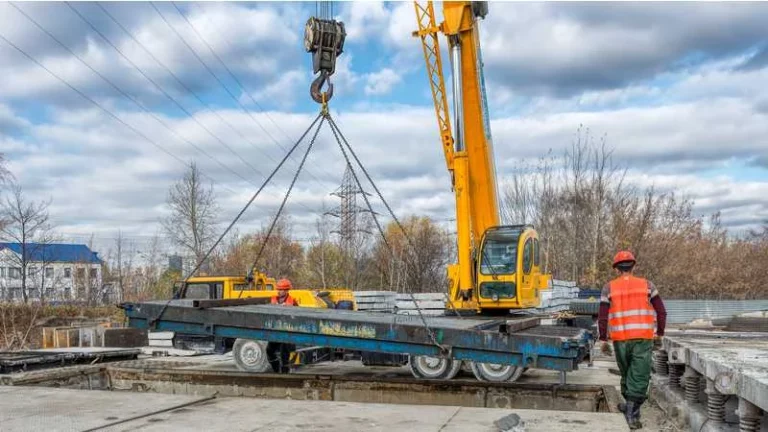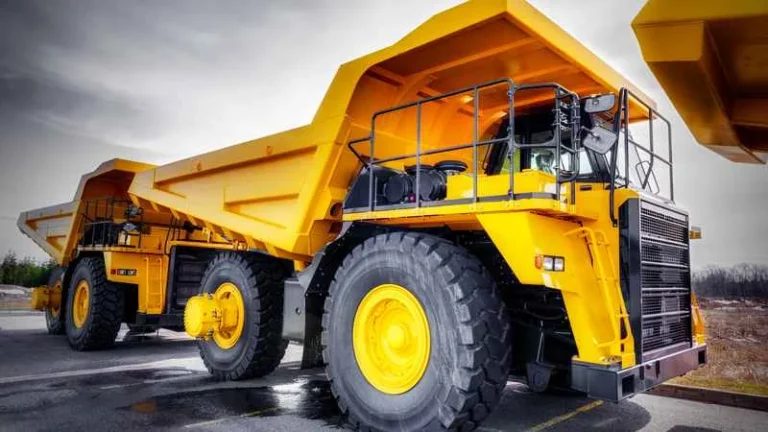Are you looking for a safe, efficient and non-invasive way to excavate? Hydro excavation is an innovative alternative to traditional digging methods that’s revolutionizing the construction industry.
This blog post dives into everything about hydro excavation from its process to benefits and essential considerations when opting this method. Keep reading to learn how this powerful technology can change the way you conquer your next digging project!
Key Takeaways
- A hydro excavator is a non-invasive method that uses high-pressure water and vacuum technology to safely dig and remove soil.
- Hydro excavation is safer than traditional digging methods because it minimizes the risk of damaging underground utilities like gas lines or water pipes.
- Hydro excavation is fast, efficient, and versatile, making it suitable for various ground conditions and depths of excavation. It also has low environmental impact by reducing the need for backfilling and minimizing land damage.
Understanding Hydro Excavation and Hydrovac Trucks
Hydro Excavation is the process of using high-pressure water and a vacuum system to safely excavate soil, while hydrovac trucks are specially designed vehicles used for this type of excavation.
Definition of Hydro Excavation
Hydro excavation is a way to move soil. A stream of water digs the ground. Then, a vacuum sucks up the dirt and puts it into a tank on a truck. It’s not like old digging methods that can hurt pipes or wires in the ground.
Hydro excavation is safe and neat. This method works well when you need to dig with care.
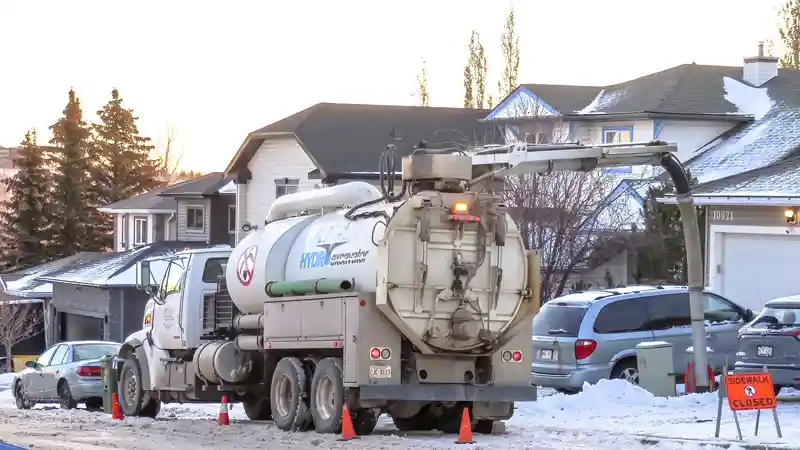
The Process of Hydro Excavation
Hydro excavation is a careful way to dig. The process starts with using high-pressure water. This water can cut soil and make it loose. After this, a vacuum pulls the loose soil up. It goes into a storage tank in the truck. Hydro excavation uses water to dig, but it can also use air. Using air is safe for buried things like gas lines and water lines. This method is very precise and quick. It lowers the need for backfill and more work time. The dug-out soil stays safe in the truck tank until it gets dumped at its right place.
Advantages of Hydro Excavation
Hydro excavation offers several advantages, including non-invasive digging, speed and efficiency, safety and security, versatility, and low environmental impact.
Non-invasive digging
Hydro excavation is a great way to dig without causing harm. It’s good for the earth and buried things like gas or water lines. The high-pressure water used in hydro excavation softens the ground.
This makes it easy to suck up dirt and make a hole. It does not tear, cut or damage what lies beneath as backhoes do. Hydro excavation digs with care, making it a top pick for safe digging jobs.
Speed and efficiency
Hydro excavation is fast and smart. It cuts down work time by using high-pressure water to loosen soil. The vacuum system then sucks up the loose dirt, making a clean hole. This method needs less people and shovels.
So, it’s very quick! It also uses fewer tools than old ways of digging like backhoes or hydraulic excavators. With hydrovac trucks, dig crews don’t have to spend hours or days on hard digging jobs anymore!
Safety and security
Hydro excavation is a safe way to dig. It lowers the risk of hurting people at work and breaking things under the ground like gas lines, water lines, or electric utility service lines.
The Common Ground Alliance sees it as a safe method to use. It also needs less workers than other ways to dig. This makes fewer chances for people getting hurt on the job by shovels, picks or metal hand tools.
So, hydro excavation can keep everyone safer while doing hard work like digging.
Versatility
Hydro excavation is good for many jobs. It helps to cut through hard ground like rock, clay and frozen soil. Also, it lets the crew work in tight spots or on rough land. They can dig deep holes or shallow trenches with ease.
Hydro excavation works well in all kinds of weather too, even when it’s cold outside! This method is not only flexible but also safe and easy to use.
Low environmental impact
Hydro excavation causes less harm to our earth. Using water for digging means less dirt to put back in the hole. That cuts down on work and helps keep earth clean. It also keeps gas lines, water lines, and electric service lines safe when we dig near them.
This way of digging is better than using shovels or picks because it doesn’t tear up so much land. We don’t have to fix as much after we finish digging. That’s good news for nature!
Disadvantages of Hydro Excavation
There are a few disadvantages to hydro excavation that should be considered. One disadvantage is that it can be more expensive than traditional excavation methods. The equipment and skilled operators required for hydro excavation can drive up the costs.
Another disadvantage is that it may not be suitable for all types of soil conditions. Hydro excavation works best on softer soils, so if the ground is hard or rocky, it may not be as effective.
Additionally, hydro excavation requires access to water and proper disposal facilities for the excavated material, which may not always be readily available in certain locations. Overall, while hydro excavation offers many advantages, there are some limitations to consider before deciding to use this method of digging.
The Use of Hydrovac Trucks
Hydrovac trucks are used for various excavation projects based on factors such as ground conditions, distance from the truck, depth of excavation, dump location, and off-road or on-road requirements.
Ground Conditions
Hydro excavation can be done in various ground conditions. Whether it’s soil, clay, sand, or gravel, hydrovac trucks are designed to handle different types of terrain. This method is especially useful in areas with frozen soil or cold weather, making it a popular choice for construction projects in Canada.
By using pressurized water and a vacuum system, the hydro excavator can safely loosen the soil without causing damage to any underground utilities like gas lines or electric wires that may be present.
The flexibility of hydro excavation allows for precise digging in different ground conditions while ensuring the safety of buried infrastructure.
Distance from the Truck
The distance from the truck is a crucial factor when using hydrovac trucks for excavation. It can affect how well the process works and how efficient it is. Different models of hydrovac trucks have different capacities for water and debris, which means they can only operate effectively within certain distances.
This is because the length of the hoses and the power of the vacuum system limit how far away the truck can be from where it’s digging. So, when considering hydro excavation, it’s important to take into account how far away the truck needs to be from your work area.
Depth of Excavation
The depth of excavation is an important consideration when using hydro excavation. Hydrovac trucks are able to dig to specific depths depending on the project requirements. This allows for precise digging without causing damage to underground utilities or structures.
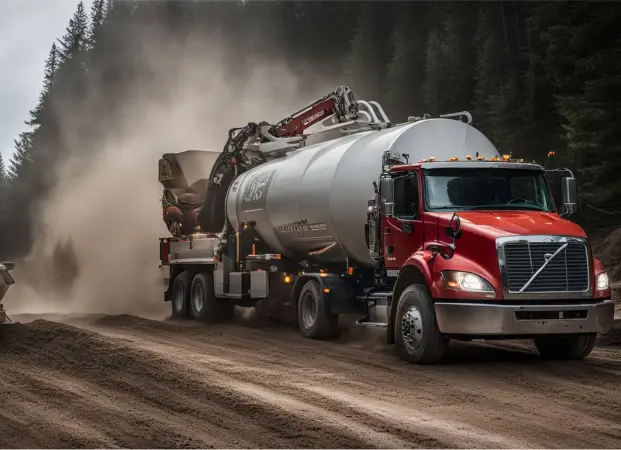
The ability to control the depth of excavation makes hydro excavation a safer and more efficient method compared to traditional excavation techniques. Plus, with hydro excavation, there is less need for backfill, reducing costs and minimizing restoration work.
Dump Location
Hydro excavation, a non-destructive digging method using high-pressure water and vacuum technology, requires a designated dump location for the excavated soil. This is where the material that has been suctioned into the hydro excavator truck is deposited.
Different models of hydrovac trucks have varying capacities and levels of vacuum and water pressure. For example, Tornado F3 hydrovac trucks can hold up to 10 yards of debris, which will then be dumped at the designated location.
Similarly, Tornado F4 and F5 hydrovac trucks also have specific dump locations for the 12 yards of debris they can handle.
Off-road or On-road
When it comes to hydrovac trucks, there are two main types: off-road and on-road. Off-road trucks are designed for use in challenging terrains like construction sites or remote locations.
They often have features like larger wheels or enhanced suspension to handle rough terrain. On the other hand, on-road trucks are typically used in urban or suburban areas with paved roads and easier access to utilities.
These trucks prioritize maneuverability and road safety features. The choice between off-road and on-road depends on specific excavation needs and environmental conditions.
Bridge Laws
Compliance with bridge laws is crucial when using hydrovac trucks. These laws determine weight and size limits for vehicles crossing bridges. Not following these laws can result in fines, penalties, and even damage to the bridge itself.
Therefore, it is important to consider the weight, dimensions, and capacity of a hydrovac truck to ensure compliance with bridge laws. By doing so, we can safely and efficiently use these trucks without causing any harm or disruption to the infrastructure.
The Differences Between Various Hydrovac Trucks
There are three main types of hydrovac trucks – the Tornado F3, F4, and F5 – each with different water and debris capacities, making them suitable for various excavation projects.
Read on to learn more about these versatile hydrovac options.
Tornado F3 Hydrovac Trucks
The Tornado F3 hydrovac truck is a type of hydro excavator that has a water capacity of 1250 gallons and can hold up to 10 yards of debris. It is specifically designed for quick and precise excavations.
This powerful truck reduces the need for backfilling and labor, making it more efficient and cost-effective. Additionally, the Tornado F3 is equipped to handle cold weather conditions and frozen soil, allowing it to work effectively in any climate.
With its high capacity and durability, the Tornado F3 hydrovac truck is a reliable choice for various industries such as oil and gas, construction, and utility companies.
Tornado F4 Hydrovac Trucks
The Tornado F4 hydrovac truck is a specialized vehicle designed specifically for hydro excavation. It has a large capacity, able to hold 1550 gallons of water and 12 yards of debris.
This means it can tackle big jobs efficiently without needing frequent trips to refill or unload. With its powerful capabilities, the Tornado F4 is an ideal choice for industries such as oil and gas, construction, and utility companies who require effective and reliable hydro excavation equipment.
Tornado F5 Hydrovac Trucks
Tornado F5 Hydrovac Trucks are a type of hydro excavation truck with a capacity of 1950 gallons of water and 12 yards of debris. These trucks are part of the Tornado series, which is sold by Custom Truck One Source.
The Tornado F5 model is designed for efficient and effective hydro excavation, allowing for precise digging and removal of soil and debris. With its large water and debris capacity, the Tornado F5 Hydrovac Truck is a reliable option for industries such as oil & gas, construction, and utility companies that require non-destructive excavation methods.
Who are the Primary Buyers of Hydrovac Units?
Oil and gas companies, contractors, pipeline companies, and utility companies are the main buyers of hydrovac units. These organizations often require excavation work for various purposes such as installing pipelines or repairing underground utilities.
Hydrovac units provide a safer and more efficient alternative to traditional excavation methods, reducing the risk of damaging buried utilities. By using hydrovac trucks, these buyers can complete their projects with greater precision and minimize disruptions to surrounding areas.
Conclusion
In conclusion, a hydro excavator is a non-destructive method used to dig and remove soil using high-pressure water and suction. It is faster, safer, and more precise than traditional excavation methods.
Hydro excavators are widely used in industries such as oil & gas and construction due to their efficiency and low environmental impact.
FAQs
1. What is a hydro excavator?
A hydro excavator is a specialized machine used for digging and excavation that uses pressurized water and a vacuum system to remove soil, debris, and other materials.
2. How does a hydro excavator work?
A hydro excavator works by injecting pressurized water into the ground through a nozzle, which helps to loosen the soil and create slurry. The slurry is then suctioned out of the hole using a powerful vacuum system.
3. What are the advantages of using a hydro excavator?
Using a hydro excavator offers several advantages such as precise digging capabilities, reduced risk of damage to underground utilities, faster excavation process compared to traditional methods, and improved safety due to reduced manual labor.
4. Where can I use a hydro excavator?
A hydro excavator can be used in various applications including utility line installation or repair, potholing for locating underground utilities, trenching for pipeline or cable installation, daylighting for exposing buried structures like pipes or cables, and even cleanup after natural disasters.

